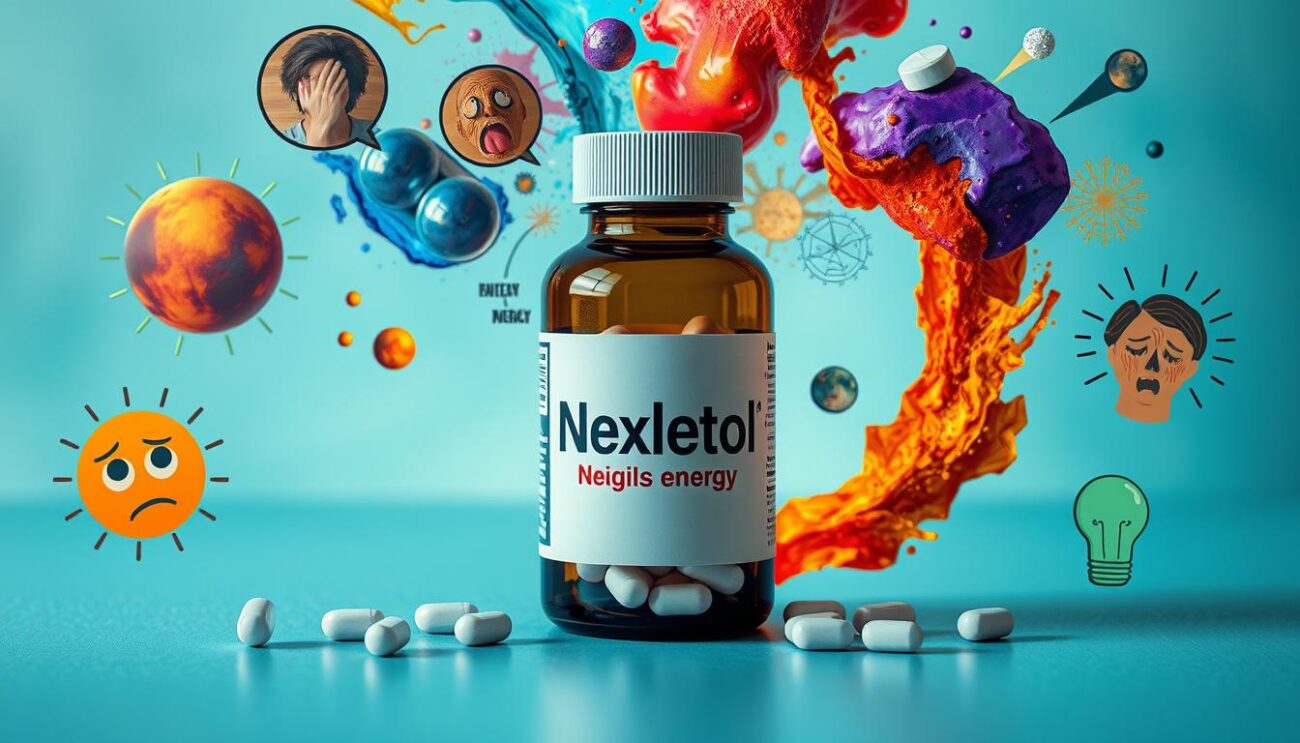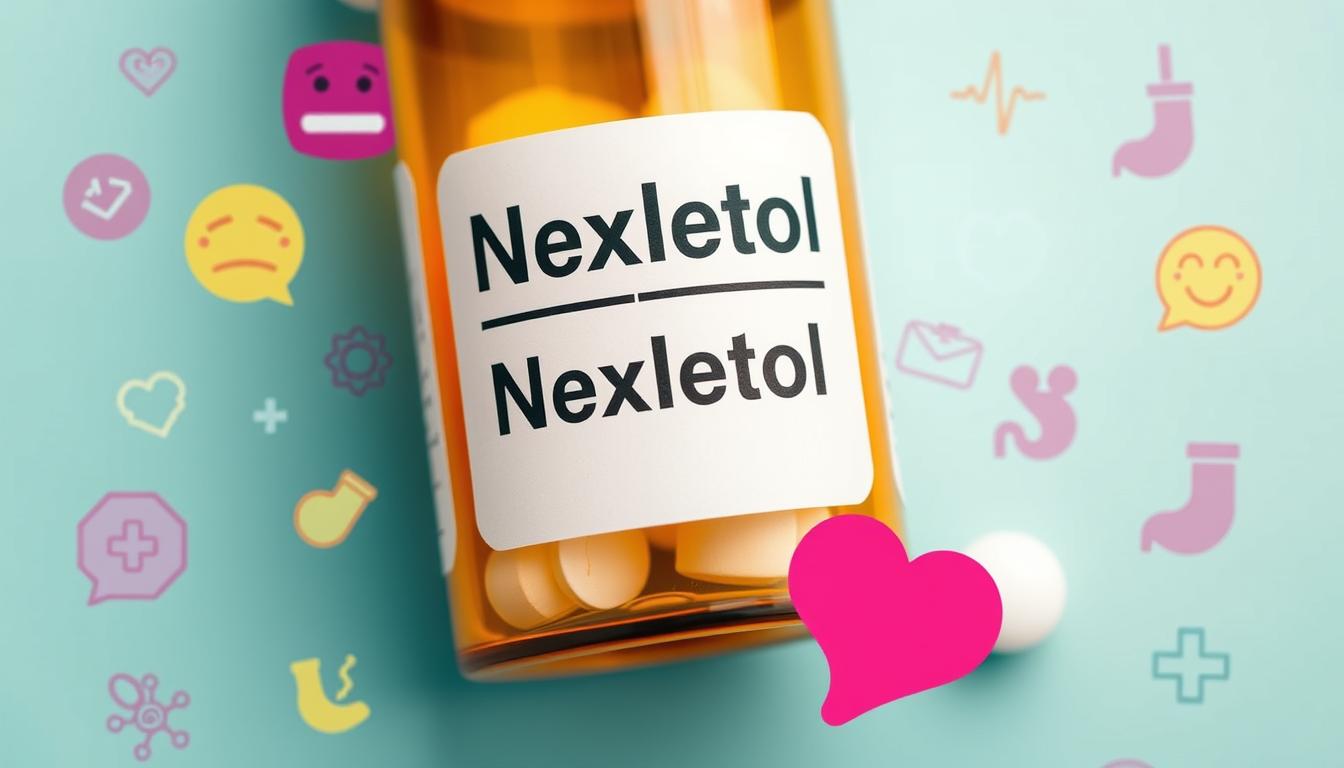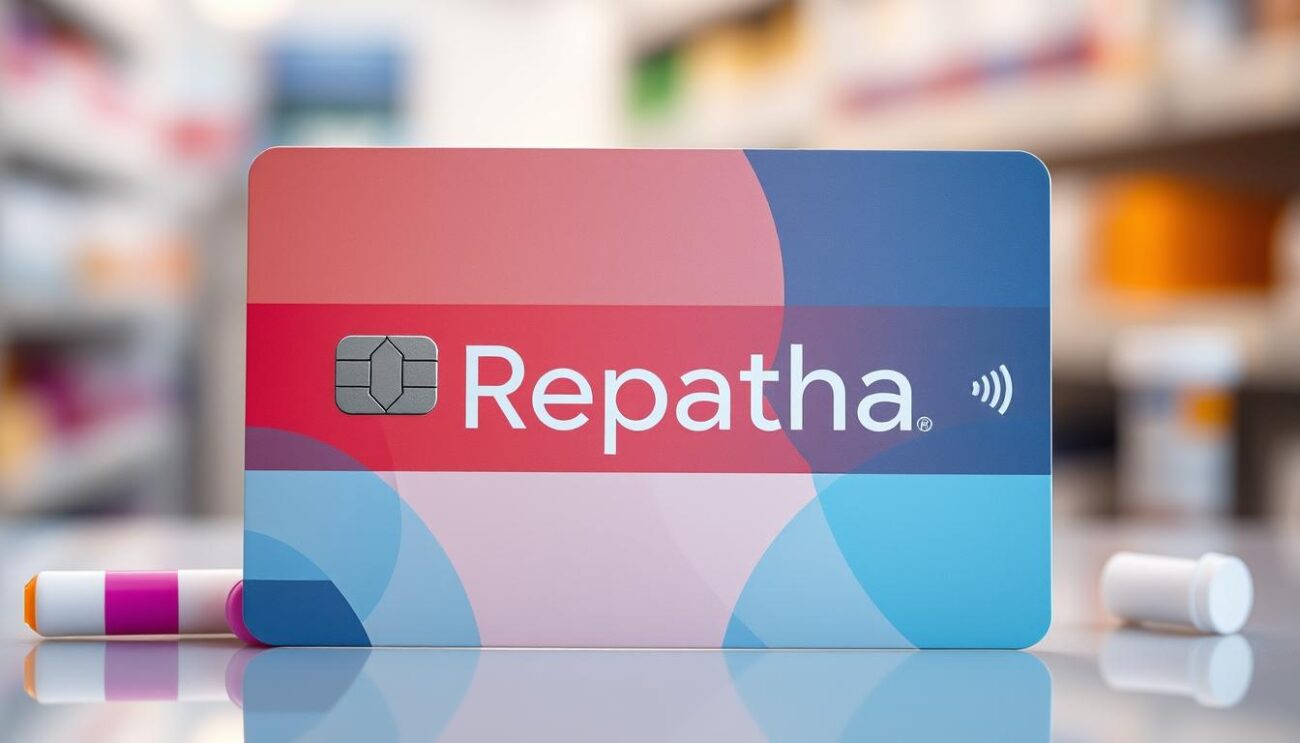Are you or a loved one taking Nexletol (bempedoic acid)? It’s key to know the possible side effects. Nexletol helps lower cholesterol and treat heart conditions. But, it’s vital to understand its safety and manage any side effects.
Key Takeaways
- Nexletol can cause mild to serious side effects, like muscle spasms and high uric acid levels.
- Severe side effects, such as allergic reactions and liver damage, are rare but serious.
- It’s important to know Nexletol’s side effects and how to handle them.
- Talk to your doctor about any side effects and report them to the FDA if needed.
- Changing your lifestyle and taking precautions can reduce Nexletol’s side effects.
Introduction to Nexletol Side Effects
Nexletol is a drug that helps lower cholesterol and prevent heart problems. It’s important for those taking it to know about possible side effects. This section will cover Nexletol, its side effects, and why it’s key to manage these risks.
Overview of Nexletol and Its Side Effects
Nexletol contains bempedoic acid and is used for high cholesterol or heart conditions. It’s effective but knowing the nexletol side effects is vital. These can include muscle pain, back issues, stomach discomfort, and lung infections.
Importance of Understanding Potential Side Effects
Knowing about bempedoic acid adverse reactions is crucial for patients and doctors. Being aware of nexletol risks and nexletol safety profile helps make better health choices. It also ensures close monitoring with healthcare teams for any side effects.
“Staying informed about the potential side effects of any medication is essential for making the best decisions about one’s health and well-being.”
Common Mild Side Effects of Nexletol
While Nexletol (bempedoic acid) is generally well-tolerated, some patients may experience mild side effects during treatment. These common side effects are typically manageable and tend to be temporary in nature.
Muscle Spasms and Body Aches
Muscle spasms are a common mild side effect of Nexletol. These involuntary muscle contractions can occur in various parts of the body, including the back, arms, and legs. Patients may also experience general body aches or discomfort. While these symptoms can be uncomfortable, they are usually not severe and often subside within a few days or weeks of starting the medication.
Gastrointestinal Issues like Abdominal Pain
Some individuals taking Nexletol may develop gastrointestinal side effects, such as abdominal pain or discomfort. This can manifest as a feeling of bloating, cramping, or general abdominal unease. In most cases, these gastrointestinal issues are mild and temporary, but persistent or worsening symptoms should be reported to a healthcare provider.
Monitoring for the occurrence of these mild side effects and promptly reporting any concerns to your healthcare team is essential for managing nexletol tolerability and ensuring a positive treatment experience. By understanding and proactively addressing these nexletol side effects, patients can work closely with their providers to manage nexletol side effects effectively.
Serious Side Effects Linked to Nexletol
Most people taking Nexletol (bempedoic acid) face only mild side effects. However, it can also cause serious issues. One major concern is the risk of tendon rupture or tear, especially in the shoulder, bicep, or Achilles tendon.
Tendon Rupture: Symptoms and Risk Factors
Those on Nexletol are more likely to face tendon problems early on. Signs of a torn tendon include hearing a pop, seeing bruises, and trouble moving the affected area. It’s vital to get medical help right away if you notice these symptoms.
Studies show that tendon rupture happened in 0.5% of Nexletol users in trials for high cholesterol. No cases were found in the placebo group. In a heart health study, tendon rupture was seen in 1.2% of Nexletol users, compared to 0.9% on the placebo.
Things that might raise your risk of tendon rupture with Nexletol include:
- Being older
- Having had tendon issues before
- Using corticosteroids or fluoroquinolone antibiotics
- Starting new, intense exercise
It’s important for patients to watch for tendon signs and tell their doctors right away. Managing nexletol risks and keeping an eye on the nexletol safety profile can help avoid serious side effects like tendon rupture.
Nexletol and High Uric Acid Levels
Nexletol can raise uric acid levels, causing hyperuricemia. This can lead to gout, a painful joint condition, often in the big toe.
High uric acid levels usually start within 4 weeks of Nexletol use. People with a history of gout are more likely to experience this side effect.
Gout and Hyperuricemia Management
It’s important to watch uric acid levels and manage hyperuricemia while on Nexletol. This can stop gout flare-ups and other problems from high uric acid.
- Regular blood tests to monitor uric acid levels
- Medications to lower uric acid levels, such as allopurinol or febuxostat
- Dietary modifications to reduce purine intake, including limiting consumption of red meat, seafood, and high-fructose foods
- Increasing water intake and maintaining a healthy body weight
- Avoiding excessive alcohol consumption
By managing hyperuricemia and gout risk, Nexletol users can lessen this side effect’s impact. This helps keep their health and wellbeing in check.
“Careful monitoring and management of uric acid levels is essential for patients taking Nexletol to prevent the development of gout and other related complications.”
Nexletol Side Effects
Nexletol is a drug for high cholesterol. It can cause side effects in patients. Most are mild, but it’s important to know the risks and watch your health.
Mild side effects include muscle spasms, body aches, and stomach pain. These usually go away as your body gets used to the drug.
But, Nexletol can also cause serious side effects. Tendon rupture is a concern, leading to pain and mobility issues. Watch for tendon signs and tell your doctor right away.
Another risk is higher uric acid levels, which can lead to gout. If you have gout or high uric acid, your doctor will keep a close eye on you.
Nexletol may also raise liver enzyme levels slightly. These changes are usually not harmful but should be checked by your doctor.

In short, Nexletol can have side effects, from mild to serious. If you’re taking Nexletol, be aware of these. Talk to your doctor about any concerns to manage your treatment well.
Liver and Kidney Implications
Nexletol, a cholesterol-lowering drug, did not show major liver damage in studies. However, it can cause high liver enzymes, which means the liver might not be working right. It also might affect the kidneys, but we don’t know how much.
Monitoring Liver Enzymes and Kidney Function
Doctors will check liver and kidney health by testing blood regularly in patients on Nexletol. It’s key to talk to your doctor right if you notice any changes in these tests. This helps catch and manage any liver or kidney problems early.
| Statistic | Value |
|---|---|
| Nexletol-treated patients with elevated liver enzymes | No significant increase reported in clinical trials |
| Nexletol-treated patients with clinically significant hyperuricemia | 3.5% versus 1.1% in placebo group |
| Nexletol-treated patients reporting gout | 1.5% versus 0.4% in placebo group |
| Placebo-adjusted increase in uric acid after 12 weeks | 0.8 mg/dL |
If you’re on Nexletol, watch for any changes in your liver or kidney tests. Tell your doctor right away if you notice anything different. Catching and managing these issues early is crucial for safe use of Nexletol.
Allergic Reactions to Nexletol
Even though Nexletol’s clinical trials didn’t show allergic reactions, they have been reported since it was approved. These reactions can be mild, like a rash, or severe, like swelling, trouble breathing, and anaphylaxis. Anaphylaxis is very dangerous and can be life-threatening.
If you’re taking Nexletol and notice any signs of an allergic reaction, call your doctor right away. Severe allergic reactions need quick medical help. If you’ve had a serious reaction to Nexletol or any of its ingredients, your doctor might suggest a different medicine.
| Symptom | Severity | Action |
|---|---|---|
| Rash | Mild | Contact healthcare provider |
| Swelling, trouble breathing | Severe | Seek emergency medical care |
| Anaphylaxis | Life-threatening | Seek emergency medical care |
If you’ve had a serious allergic reaction to Nexletol or any of its parts, your doctor might suggest another medicine. It’s important to manage nexletol side effects and watch for nexletol contraindications to keep you safe and healthy.
“Patients should be aware of the potential for allergic reactions and report any concerning symptoms immediately to their healthcare provider.”
Understanding how to manage nexletol side effects helps patients work with their healthcare team. This ensures Nexletol is used safely and effectively.
Managing Nexletol Side Effects
Managing the side effects of Nexletol is key to a good treatment experience. It’s important to talk openly with your healthcare provider. They can watch for side effects, change your dosage, or suggest other treatments if needed.
You might also need to change your lifestyle. This could mean avoiding hard physical activities or watching what you eat. This can help with side effects like high uric acid levels.
Communication with Healthcare Providers
Regular visits and talking openly with your healthcare provider are crucial. Tell them about any unusual symptoms or changes. They can adjust your medication or offer tips on handling side effects.
Staying in touch with your healthcare team ensures Nexletol is used safely and effectively.
Lifestyle Adjustments and Precautions
Patients taking Nexletol may need to make lifestyle changes. This could include:
- Avoiding hard physical activities to prevent tendon problems
- Watching what you eat, especially foods high in purines, to control uric acid levels
- Being careful with other medicines that might interact with Nexletol, as advised by your healthcare provider
By being proactive and working together, patients can manage Nexletol side effects. This way, they can get the most benefits from the medication while keeping risks low.
Nexletol and Heart Health Benefits
Nexletol may have some side effects, but it also has heart health benefits. It is mainly used to lower cholesterol and prevent heart attacks and surgeries. This includes stent placement or bypass surgery.
Clinical trials show nexletol can lower bad (LDL) cholesterol levels. This is a major risk factor for heart disease. By controlling cholesterol, nexletol can reduce the risk of heart problems in patients with heart disease or at high risk.
Potential Cardiovascular Risk Reduction
Studies with nearly 14,000 patients found nexletol lowers cholesterol by 21% more than a placebo. It also reduces the risk of heart attacks.
Nexletol may not lower LDL cholesterol as much as statins. But, it’s still a good option for those who can’t take statins or need extra help managing cholesterol.
The FDA approved nexletol in 2020 for treating familial hypercholesterolemia and confirmed heart disease. It’s effective in reducing heart events. For those who can’t take statins or need more help, nexletol is a good alternative for heart health.
Comparing Nexletol Side Effects to Other Cholesterol Medications
Managing high cholesterol, patients have many options besides Nexletol. Nexletol helps lower LDL cholesterol, but it’s important to know its side effects compared to other drugs.
Nexletol, like statins, can affect the liver and cause muscle issues. But, it also has unique risks like tendon rupture and high uric acid levels. These are not common with statins.
In studies, Nexletol had fewer side effects than a placebo, like liver issues and kidney problems. But, it might cause more problems in men’s prostates and allergic reactions.
Choosing Nexletol or other drugs depends on your health history and goals. Talking to your doctor about these options helps find the best treatment for you.
Weighing the Risks and Benefits
Nexletol may help some patients, but its side effects are important to consider. The CLEAR Trial showed Nexletol reduced heart risks by 30% over nearly 40 months. But, it takes many patients and years to prevent one heart event.
Knowing the differences in side effects between Nexletol and other drugs helps patients make better choices. This way, they can work with their doctors to manage their health safely and effectively.
“Before switching from Nexletol to an alternative medication, it is crucial to discuss all health conditions with a healthcare provider and not stop taking Nexletol abruptly.”
Conclusion
Nexletol is a medication that helps lower cholesterol. It can be very helpful for many people. But, it’s important to know about the possible side effects.
Side effects can range from mild to serious. These include muscle spasms, stomach problems, tendon ruptures, and high uric acid levels. Knowing these risks and working with your doctor is key. This way, you can have a good experience with the treatment and get the most heart health benefits.
Being aware of Nexletol’s side effects helps you make better choices for your health. It can reduce heart attack risk by 23% and lower cardiovascular event risk by 13% for those who can’t take statins. This shows its potential to greatly benefit heart health when used right.
In short, Nexletol can be a great tool for managing cholesterol. But, it’s important to think about the side effects and work closely with your doctor. By staying informed and careful, you can use Nexletol to improve your heart health while avoiding risks.




